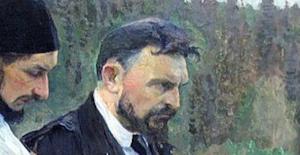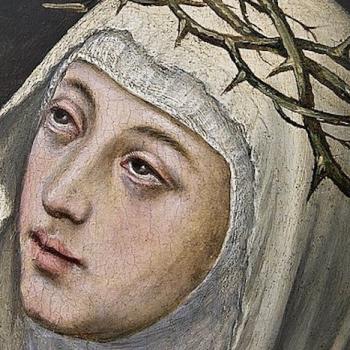
“Growth in holiness and ascent from grace to grace does not occur automatically, but actively… ‘synergistically,’ in Christ and with Christ….” —Sergei Bulgakov
Bulgakov and Me
As a Wesleyan, raised on a steady diet of sermons on sanctification in Nazarene Churches, there’s a certain retrospective obviousness to my finding my way to Bulgakov’s theology of deification.
I first heard the name Sergei Bulgakov from one of my professors, Gene Rogers. Gene was reading the Russian theologian in French translations in the 90s. That was before anyone else that I knew had heard of him. I’d studied Russian in college, and had enough French to fill in the gaps. So I decided to follow Gene’s direction and see what was happening there. This was around the time when Boris Jakim began translating the major works into English at an alarming pace. That helped more than a little.
When it was time to decide on my dissertation topic, my advisor and mentor John Milbank suggested I “do something on perfection.” I was not overjoyed by the idea, since I could imagine about 500 ideas that seemed more engaging and exciting to me. But he eventually convinced me. “It will be a way of giving the gift of the tradition to your Nazarenes, and the gift of Nazarene holiness to the tradition.”
By this time I’d read a good bit of Bulgakov, and knew that I wanted him to guide me in this work. John and Gene decided—perhaps with some begging on my part—to offer a team taught course on the “Russian School,” so I got to dig in with my classmates. I started getting excited about the way that that Bulgakov’s account of deification resonated with, but for me expanded and deepened, the teachings on holiness I’d grown up with.
Is Holiness for Humans?
We were made to share in God’s holiness. That’s something I suppose I’ve always implicitly believed, even through my agnostic period in early adulthood. It’s the heart of the Holiness Code in Leviticus, and the key theme of John Wesley’s preaching.
But the unsettling question for me was what to do about all the human energy. The hunger (literal and metaphorical), the distractions, the moods. Surely all that thick humanity has no place in a life that shares in God’s holiness. So what do we do with it? Is it the luggage that we learn to discard? Ought it be a source of guilt and/or shame until we do? But then isn’t shame also a human energy that serves ultimately just to identify the gap between my life and God’s?
This is where Bulgakov had some help for me. “The creature is not made to be immovable in the least. Even while participating in the eternity of God, it does not lose the temporal, creaturely character of its existence.” I was imagining holiness as a loss of human “mobility,” all those moods and changes that characterize me and not God. But what if all of that is a human way—can be a human way—of sharing God’s nature? What if God meant it when God created embodied humans who got hungry and sleepy and confused, and then called us “good?”
How to Participate in God
In that case, holiness doesn’t look like quietude. It’s not a shutting down of all that activity, but a patterning of it all with the character of God. This is why 2 Peter can describe all the “effort” we put into the formation of habits of goodness, knowledge, self-control, endurance, mutual affection, and love. On one level this advice is ridiculous: the author lists those characteristics because they are qualities of the divine nature (1:4-7). We’re bound to fail in our efforts of participation.
But Bulgakov helped me see that the outcome of Christian habit-formation is not to make myself less human and more divine, but rather to enjoy divine things in a humanly appropriate way. “This growth in holiness and ascent from grace to grace does not occur automatically, but actively, and, of course, “synergistically,” in Christ and with Christ….” I’m something like a child, invited to make pancakes with her parent. I’m not going to be particularly good at this holiness thing, but it’s going to make my day to discover that God wants my help!
Docetic Sanctification
The “in and with Christ” language here is important. To assume that more of God’s holiness means less of my own humanity is to tread on christological heresy. Because if that’s true for me, and my life is hid with God in Christ, then it must be true of Christ. And a whole lot of blood and ink was spilled in the early centuries of Christianity to make sure that by calling Jesus “divine” we weren’t calling him “nonhuman.” There’s actually a whole set of heresies there, which we could group under the umbrella of docetism.
So let’s call this problematic account of holiness “docetic sanctification.” It’s the notion that more holiness means less humanity. This is what Bulgakov helped free me from.
“Deification has no ceiling,” he tells us. Carrying on the tradition of Gregory of Nyssa, he wants us to know that holiness is never finished, because the God whose life we share in is unfinishable. So to be fully human is to go on enjoying those habits of mutual affection and the rest in saecula saeculorum (“world without end”).
Holiness beyond Enclaves
These are the ideas I explored in my dissertation, which I called Making Perfection: A Experiment in Theological Ontology. I then retooled them for my first book, Diagonal Advance: Perfection in Christian Theology. Bulgakov’s presence receded in the book, though he’s still there under the surface. I suppose I’m still leaning on him pretty heavily to fulfill the task my advisor gave me over two decades ago: to give an account of holiness to the broader Christian traditions, and to give the broader traditions to Christians in pursuit of holiness.
The Bulgakov quotes in the post come from a new translation of essays. In grad school I was focused on the books listed here.














